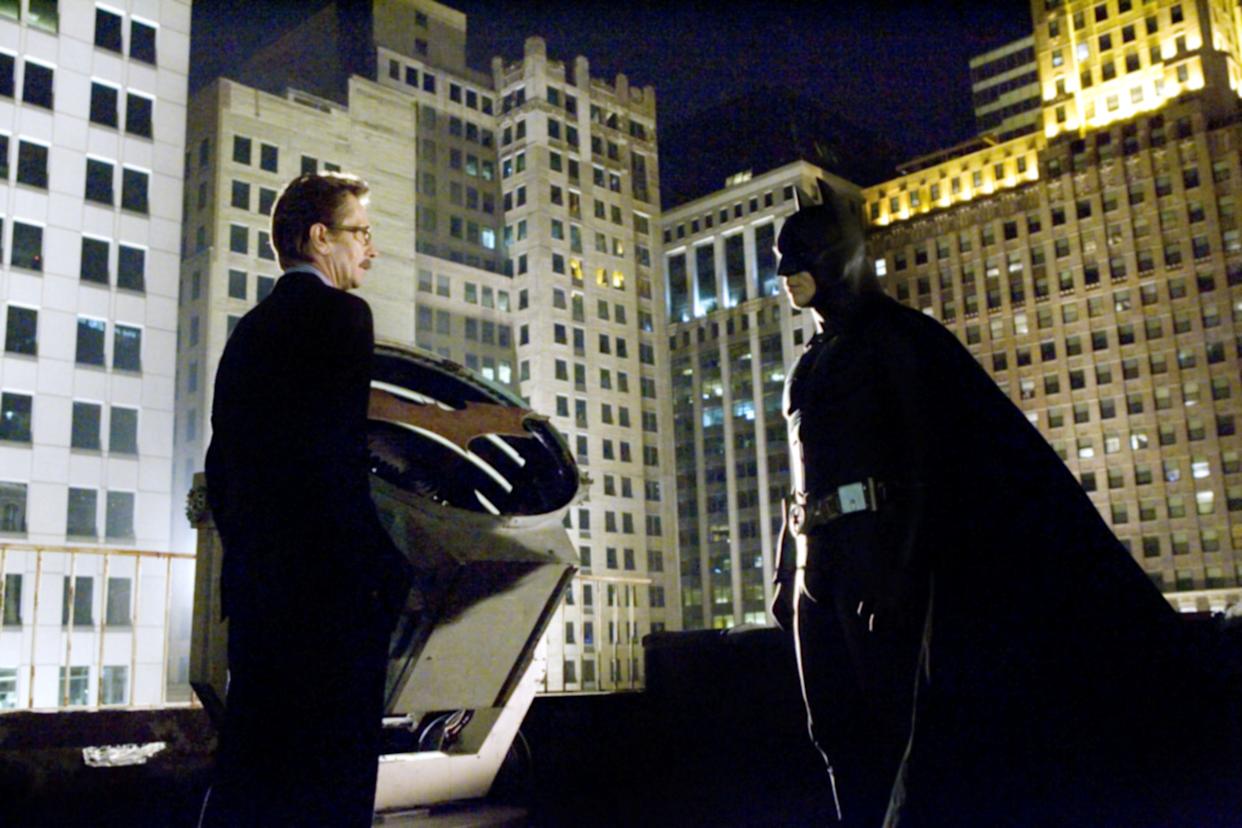The Dark Knight: Defying Expectations and Setting a New Standard for Superhero Movies

As we mark the 20th anniversary of "The Dark Knight," it's crucial to reflect on the film's groundbreaking approach and the challenges it faced during its production. The film's co-writer, David S. Goyer, recently shared on the Happy Sad Confused podcast that Warner Bros. executives were initially hesitant about the decision to introduce Heath Ledger's Joker in a mysterious and unpredictable way. Up until that point in the film, most of the story focused on Batman and Harvey Dent, including their investigation into the mysterious clown-faced killer. Goyer explained that this was intentional, as "The Dark Knight" was meant to be a psychological thriller rather than just a standard superhero movie. "They were not happy about that," Goyer said. "No disrespect to the actors who played Batman and Harvey Dent prior to this, and as moviegoers we were always waiting for the character to reveal the identity of the Joker. But why is that?" To address this issue, Goyer and director Christopher Nolan compared "The Dark Knight" to other superhero movies and "clocked the minute into the film the character had revealed the identity of the Joker." They realized that they weren't much farther than other films in terms of when the character revealed their enemy's identity. However, "The Dark Knight" and its sequel "The Dark Knight Rises" were meant to be more than just a standard superhero movie. Goyer explained that they knew early on that they needed to have the audience invested in the characters and their relationships before revealing the identity of the Joker. This led to the iconic scene where the Joker appears in his full costume and reveals his identity to Batman and Harvey Dent. In the end, it was the rapturous reception audiences gave "The Dark Knight" that mattered, not the perspective of the suits. The film has since become a top-tier classic of superhero cinema and is widely considered a benchmark for modern superhero movies. It's a testament to the power of a well-crafted psychological thriller that can captivate audiences and leave a lasting impression. The success of "The Dark Knight" is not just a testament to its unique approach but also to its ability to create memorable characters and relationships that resonate with audiences. The film's portrayal of Batman as a complex and flawed hero, as well as its exploration of themes such as morality, guilt, and sacrifice, made it a landmark in superhero cinema. To learn more about "The Dark Knight" and other interesting stories from Hollywood, be sure to follow Indiewire on Facebook, Twitter, and Instagram for the latest news and updates.
The masterpiece 'The Rise of the Dark Knight' not only defied conventional expectations by profoundly redefining Batman and his mortal journey, but also etched its place as an unparalleled benchmark in superhero cinema.
The Dark Knight not only defied conventional expectations of superhero film genres by its dark, complex narratives and deep psychological insights but also established a new benchmark for cinematic storytelling with anticipation-inducing twists.
The Dark Knight transcends mere superhero narratives; it's a psychological masterpiece that defies audience expectations, establishing an unparelleled standard in the genre with its nuanced characters and intellectually stimulating plot twists.
The Dark Knight transcends the boundaries of superhero cinema with its psychological thrills that defy expectations and establish a new standard for emotional depth, character development in cinematic heroes.
The Dark Knight not only defied our expectations by tackling complex moral dilemmas and offering a hard-hitting noir twist on the superhero genre, but it also set an unparalleled standard for storytelling in contemporary cinema.
The Dark Knight not only defied expectations by transcending the bounds of traditional superhero films, it set a new standard for cinematic ambition and character-driven storytelling in its portrayal of gritty realism amidst moral complexity.
The Dark Knight, made a remarkable leap forward in superhero film-making by defying conventional expectations and setting an unprecedented benchmark for depth of character development within the celebrated genre.
In its bold exploration of the moral complexities and psychological depths beyond traditional superhero fare, 'The Dark Knight' not only defied expectations but revolutionized行业标准for superherofilmmaking by setting a new standard for storytelling that continues to inspire generations.
Scoring by Hans Zimmer and the lush visuals of 'The Dark Knight' not only defy conventional expectations with their layered, nuanced storytelling but also set a new benchmark for cinematic superhero movies known still today as an unparalleled masterpiece.
The Dark Knight not only defied conventional expectations with its intense and mature plot, but it also set a new standard for superhero movies by expertly blending action spectacle with psychological depth.
The Dark Knight, transcending the expectations set by its predecessors with a nuanced examination of righteousness versus sacrifice and an unparalleled cinematography that defines superhero films' new standards.
In its bold departure from conventional superhero film formulae, 'The Dark Knight' sets a new standard by defying expectations of darkness and intrigue while maintaining the familiar charm that cinematic aficionados have come to anticipate.














